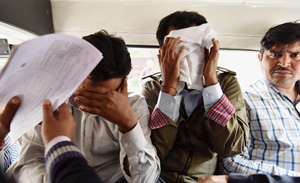New Delhi, April 18: Delhi Police today filed charge sheet against 13 persons arrested in connection with the Petroleum Ministry document leak case.
Crime Branch of Delhi Police filed the charge sheet before Metropolitan Magistrate Akash Jain, who fixed April 20 for its consideration.
According to police sources, the accused have been charge sheeted for the alleged offences punishable under sections 457 (trespass), 380 (theft), 420 (cheating), 468 (forgery for the purpose of cheating), 471 (using as genuine forged documents), 120-B (criminal conspiracy) and 34 (common intention) of IPC.
The court fixed the 44-page charge sheet for consideration before Chief Metropolitan Magistrate Sanjay Khanagwal, who was on leave today.
The police have arrayed 42 prosecution witnesses in the case.
Police sources said that provisions of the stringent Official Secrets Act (OSA) have not been invoked against the accused yet and further investigation is going on.
On April 15, the Ministry of Petroleum and Natural Gas in its report had told the court that eight documents recovered from the accused in the case were classified in nature and none of documents seized from them were in public domain.
Among the 13 accused are five corporate executives-- Shailesh Saxena from RIL, Vinay Kumar from Essar, K K Naik from Cairns India, Subhash Chandra from Jubilant Energy and Rishi Anand from Reliance ADAG.
Other eight accused are Ishwar Singh, Asharam, Rajkumar Chaubey, Lalta Prasad, Rakesh Kumar, Virender Kumar, energy consultant Prayas Jain and journalist Shantanu Saikia.
All the accused are in judicial custody.
On April 10, the court had sought reports from the Home and the Petroleum ministries about the nature of documents recovered by the investigators during their probe.
On February 20, police had arrested the five accused corporate executives alleging that they used to procure the classified documents from other arrested accused Lalta Prasad and Rakesh, and used to pay them.
The documents were then supplied to the firms by these officials for their benefit, the police had alleged.
A total of 16 people have been arrested so far in connection with the two separate FIRs lodged by Crime Branch.
On February 20, police had arrested the five corporate executives alleging that they used to procure the classified documents from Lalta Prasad and Rakesh and used to pay them.
The documents were then supplied to the firms by these officials for their benefit, the police had alleged.
The police had earlier told the court that sensitive documents of Ministries of Coal, Power and others were recovered during the investigation.
In its FIR, the police had said that photocopies of sensitive documents including inputs on the Finance Minister's budget speech were recovered from the possession of accused Rakesh Kumar.
"Photocopy of documents with heading input material on National Gas Grid for inclusion in Finance Minister's budget speech 2015-16," it had said in its FIR.
A total of 16 people have been arrested so far in connection with two separate FIRs lodged by the Crime Branch.





Comments
Add new comment